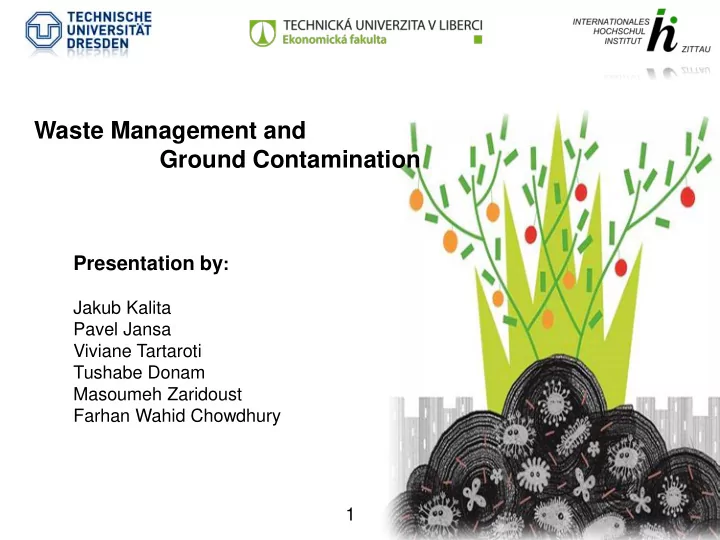

Waste Management and Ground Contamination Presentation by : Jakub Kalita Pavel Jansa Viviane Tartaroti Tushabe Donam Masoumeh Zaridoust Farhan Wahid Chowdhury 1
Waste Management and Ground Contamination Overview: • Classification of waste • Definition of waste management • Methods of waste management • Case studies • Solutions 2
Classification of Waste 1. Liquid Waste: Found in household and industries 2. Solid Rubbish Found in your household along with commercial and industrial locations 2.1 Plastic Waste 2.2 Paper/card Waste 2.3 Tins and Metals 2.4 Ceramic and Glass 3. Organic Waste All food waste, garden waste, manure and rotten meat 3
Classification of Waste 4. Recyclable Rubbish paper, metals, furniture and organic waste 5. Hazardous Waste all types of rubbish that are flammable , toxic, corrosive and reactive. 4
Waste Management Definition : Collection ,Transportation and Disposal of Waste • Waste Management is the process of treating solid wastes and offers variety of solutions for recycling items that don’t belong to trash • Waste management is something that each and every household and business owner in the world needs. Waste management disposes of the products and substances that you have use in a safe and efficient manner 5
Waste Management Methods Waste Disposal 1. Landfills Burying the waste in the land • most popularly used method • Commonly found in developing Countries • raise to air and water pollution 2. Incineration/Combustion Municipal solid wastes are burned at high temperatures so as to convert them into residue and gaseous products • Advantage: Reduce the volume of solid waste to 20 to 30 percent of the original volume decreases the space they take up and reduce the stress on landfill 6
Waste Management 3.Recovery and Recycling Recovery : Process of taking useful discarded items for a specific next use. These discarded items are then processed to extract or recover materials and resources or convert them to energy in the form of useable heat, electricity or fuel. Recycling: Process of converting waste products into new products to prevent energy usage and consumption of fresh raw materials 7
Waste Management 4. Plasma Gasification The waste’s molecular bonds are broken down as result of the intense heat in the vessels and the elemental components . 5.Allowing organic materials to sit in one place for months until microbes decompose it. Composting is one of the best method of waste disposal as it can turn unsafe organic products into safe compost 8
Waste Management 6.Waste to Energy Converting of non-recyclable waste items into useable heat , electricity, or fuel through a variety of processes 9
Waste Management 7. Waste Minimization Recycling old materials like jar, bags, repairing broken items instead of buying new one, avoiding use of disposable products like plastic bags, reusing second hand items, and buying items that uses less designing. 10
What can happen if the waste management fails? Brazil’s worst mining disaster (Hazardous Waste) Photo: Rogério Alves / TV Senado 11
What can happen if the waste management fails? Brazil - November 2015 • River Rio Doce • Samarco Company, Brazil’s Vale S.A. and Australia’s BHP Billinton Ltda • Iron ores mining 12
What can happen if the waste management fails? Figure: Phillips, Dom. 2016. “Samarco Dam Collapse: One Year on From Brazil’s Worst Environmental Disaster.” The Guardian , 15 de outubro. https://goo.gl/rXLd3s 13
What can happen if the waste management fails? Figure: Comboios beach with mining tailings in seawater Regência Augusta. Nov. 2016 14
What can happen if the waste management fails? • 19 people were killed in floods. • the damage for the ecosystems is really difficult to be evaluated in the long-term. • about 40 villages on the way were affected. 15
Waste in the Pearl! The pearl of Africa has waste too! ... A lot! • 2 Uganda; 3 of the waste generated is not collected • Capital city- Kampala ~ 1,200–1,500 tonnes of garbage daily Growing urban population= more waste • Uncollected waste, dumped • indiscriminately in the streets and in drains Mixes with human and animal • excreta 16
Uganda’s Solid Waste 17
Causes Situation grim in slums Many perceive waste collection as a luxury, not a necessity (ignorance). Few dumping sites low price of packaging material e.g. Poor government attitude polythene bags towards waste management 18
Consequences • Human sanitation and Health: unpleasant smell; breeding sites for flies and • other vectors communicable diseases such as cholera • • Ecosystem health pollution of surface and ground water • high concentration of nitrates near rivers • • Obstacle to development blockage of drainage channels by mud, • polythene and other solid wastes create pools of water, potholes develop on the roads . 19
Typical day in Uganda . 20
What can help? • Prevention of waste • Preparing for re-use • Recycling • Material of energy recovery • Disposal . 21
Zero-waste Bulk Stores . 22
Zero-waste Bulk Stores • No plastic or non-recyclable material, container-to-container Advantages: Disadvantages: • Reduce of WM • Expensive • Easy packing • No infrastructure • Healthier • Reluctance • Fresh products • Heavy packaging and carrying . 23
Waste to build roads • Plastic roads • India • More than 21 000 miles • Faster, simpler . 24
Waste-to-energy • Burning municipal and industrial solid waste • Steam for electricity, heat buildings etc. Reduction of waste – 87 ٪ • Europe – 50 million tons of waste energy • • Electricity for 27 million Europeans • Ecology + economy • Link: https://www.youtube.com/watch?v=UYvprn_RRs8 . 25
Thank You
Recommend
More recommend